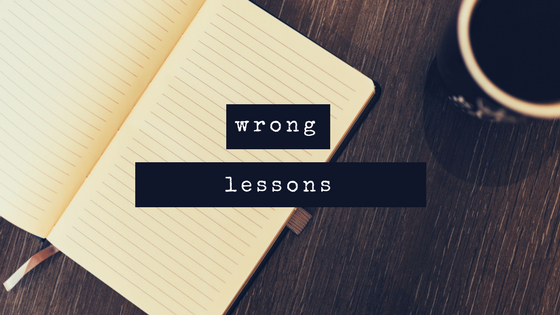In school, we learn the fundamentals in the classroom. We’re focused on by-the-book learning and often adhere to a teacher’s lesson plan. This structure works for some subjects, but many of the skills needed for a career are ignored. Many of the skills enforced by the education system counterproductive and students learn the wrong lessons in class. These are some of the lessons students learn in school that aren’t the best skills to have:
Don’t Ask Questions
Clarifying assignments is encouraged, but for the most part, students are discouraged from questioning the material taught in the classroom. Many subjects taught in school are rooted in theory or research. Depending upon the topic, there are many scenarios where the body of knowledge is rapidly evolving. For this reason, the material should not be accepted as fact.
Higher level learning may encourage this style of questioning, but this emphasis is due to the fact that students are bred not to question content. Despite this, students are still quick to turn to the answer key in the back of the book to find a solution, even when there is no one correct answer.
Someone Has the Answer
Similar to the above lesson, students often believe someone knows the correct solution to their problem. In some coursework, there may be an answer, but there are many situations where there is no definite answer.
In social situations, students will rely on the authority figures for solutions. Many of these individuals try to assess situations with an unbiased eye, but without full knowledge they’re not able to get an exact understanding. Still, they provide solutions that students will cling to. This creates the illusion that teachers know all, and they don’t They’re regular people trying to make the best decision they can with the knowledge provided.
Don’t Talk Back
In school, the fear of punishment dictates a lot of interactions. Even when a student disagrees with an authority figure, they’re encouraged to stay silent. While self-control is valuable, knowing when to speak up and advocate for yourself may be more valuable. Of course, I am not encouraging students to interrupt teachers or disrespect an individual personally. Rather, students should be conformable disagreeing or offering an alternate perspective.
When these students enter their careers, they’re in for a rude awakening. Speaking up and questioning authority can result in increased productivity and modification of work styles. If they don’t speak up, they’ll likely get walked over and taken advantage of. Knowing when to talk back may be tricky, but it’s also very important when trying to leave an impact.
Grades Matter
In many ways, grades do matter. They influence your completion of schooling and readiness for college. However, grades are not the only way to assess performance. Outside of academia, grades will be far less influential to your success. They are used in school to measure successful completion of lessons, but they don’t measure many other areas of development.
Outside of schooling, subject knowledge is only one element influencing your success. Your ability to communicate and form social bonds with others will influence your success. You will also need to be skilled in problem solving and abstract thinking. Even when you put in A+ work, people find success in assessment and process improvement. Really, there are an unlimited number of skills you can enhance to boost your success, but many of these cannot be summarized in a single grade.
You Need to Fit In
In school, children are faced with immense pressure to fit in. I can’t blame them either, it’s hard to get through years of schooling feeling like an outsider. Once you leave school, you’ll likely find your individuality is your best asset. Rather than changing yourself to fit in with others, you should look for others who have genuine commonalities with you. These are the friends who will last beyond school and help you become a better person.
A good company isn’t going to hire someone who is the same as everyone else. Companies should be looking for people who are qualified to get the job done, but unique enough to think differently. These people will challenge the norm and improve productivity with a new perspective. This ability is developed over time, so someone with a different background is likely to think differently and encourage change.
Conclusion
My intent is not to downplay the roles of teachers. They are critical to the development of children and have dedicated a significant amount of time to ensuring the well-being of their students. Teachers have a tough job, and even those who want to challenge the status quo are assessed based off of testing score.
When looking at students who have just graduate high school or who are looking to find their first job, it’s immediately apparent their frame of mind is different from someone who has benefited from a few years in the workforce. While it is expected that someone will develop skills as they gain more work experience, this also reflects the fact that much of what we learn in school doesn’t translate into job skills. With knowledge of these wrong lessons, students and teachers can work to improve their skills moving forward.





